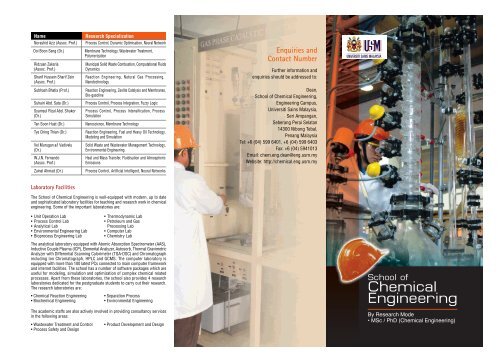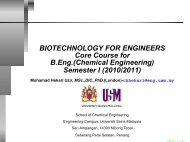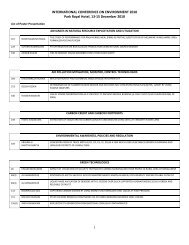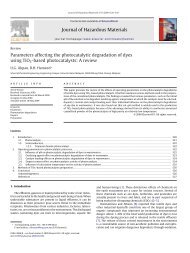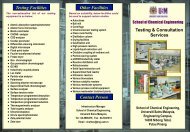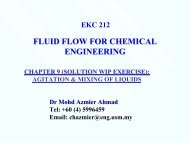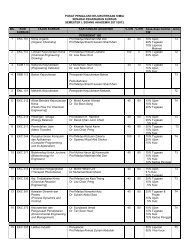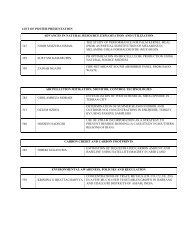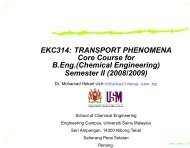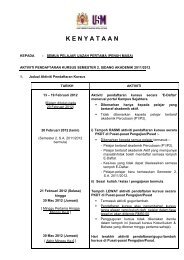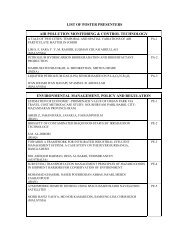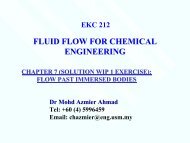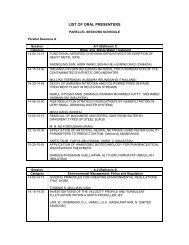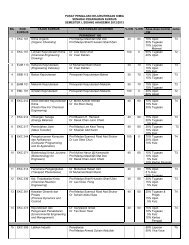Research Mode - School of Chemical Engineering, USM
Research Mode - School of Chemical Engineering, USM
Research Mode - School of Chemical Engineering, USM
- No tags were found...
Create successful ePaper yourself
Turn your PDF publications into a flip-book with our unique Google optimized e-Paper software.
NameNorashid Aziz (Assoc. Pr<strong>of</strong>.)Ooi Boon Seng (Dr.)Ridzuan Zakaria(Assoc. Pr<strong>of</strong>.)Sharif Hussein Sharif Zein(Assoc. Pr<strong>of</strong>.)Subhash Bhatia (Pr<strong>of</strong>.)Suhairi Abd. Sata (Dr.)Syamsul Rizal Abd. Shukor(Dr.)Tan Soon Huat (Dr.)Tye Ching Thian (Dr.)Vel Murugan a/l Vadivelu(Dr.)W.J.N. Fernando(Assoc. Pr<strong>of</strong>.)Zainal Ahmad (Dr.)<strong>Research</strong> SpecializationProcess Control, Dynamic Optimisation, Neural NetworkMembrane Technology, Wastewater Treatment,PolymerizationMunicipal Solid Waste Combustion, Computational FluidsDynamicsReaction <strong>Engineering</strong>, Natural Gas Processing,NanotechnologyReaction <strong>Engineering</strong>, Zeolite Catalysis and Membranes,Bio-gasolineProcess Control, Process Integration, Fuzzy LogicProcess Control, Process Intensification, ProcessSimulationNanoscience, Membrane TechnologyReaction <strong>Engineering</strong>, Fuel and Heavy Oil Technology,<strong>Mode</strong>ling and SimulationSolid Waste and Wastewater Management Technology,Environmental <strong>Engineering</strong>Heat and Mass Transfer, Fluidisation and AtmosphericEmissionsProcess Control, Artificial Intelligent, Neural NetworksEnquiries andContact NumberFurther information andenquiries should be addressed to:Dean,<strong>School</strong> <strong>of</strong> <strong>Chemical</strong> <strong>Engineering</strong>,<strong>Engineering</strong> Campus,Universiti Sains Malaysia,Seri Ampangan,Seberang Perai Selatan14300 Nibong Tebal,Penang MalaysiaTel: +6 (04) 599 6401, +6 (04) 599 6403Fax: +6 (04) 5941013Email: chem.eng.dean@eng.usm.myWebsite: http://chemical.eng.usm.myLaboratory FacilitiesThe <strong>School</strong> <strong>of</strong> <strong>Chemical</strong> <strong>Engineering</strong> is well-equipped with modern, up to dateand sophisticated laboratory facilities for teaching and research work in chemicalengineering. Some <strong>of</strong> the important laboratories are:• Unit Operation Lab• Process Control Lab• Analytical Lab• Environmental <strong>Engineering</strong> Lab• Bioprocess <strong>Engineering</strong> Lab• Thermodynamic Lab• Petroleum and GasProcessing Lab• Computer Lab• Chemistry LabThe analytical laboratory equipped with Atomic Absorption Spectrometer (AAS),Inductive Couple Plasma (ICP), Elemental Analyzer, Autosorb, Thermal GravimetricAnalyzer with Differential Scanning Calorimeter (TGA-DSC) and Chromatographincluding Ion Chromatograph, HPLC and GCMS. The computer laboratory isequipped with more than 100 latest PCs connected to main computer frameworkand internet facilities. The school has a number <strong>of</strong> s<strong>of</strong>tware packages which areuseful for modeling, simulation and optimization <strong>of</strong> complex chemical relatedprocesses. Apart from these laboratories, the school also provides 4 researchlaboratories dedicated for the postgraduate students to carry out their research.The research laboratories are:• <strong>Chemical</strong> Reaction <strong>Engineering</strong>• Biochemical <strong>Engineering</strong>• Separation Process• Environmental <strong>Engineering</strong>The academic staffs are also actively involved in providing consultancy servicesin the following areas:• Wastewater Treatment and Control• Process Safety and Design• Product Development and Design
IntroductionThe <strong>School</strong> <strong>of</strong> <strong>Chemical</strong> <strong>Engineering</strong> (SCE), Universiti Sains Malaysia has beenstriving to maintain high pr<strong>of</strong>essional standards with a strong research orientationsince its establishment in 1992. SCE has state <strong>of</strong> the art laboratories and modernresearch facilities in addressing the needs <strong>of</strong> industry and the country. Academicsat SCE have been engaged in various research projects funded both by the publicand private sectors. The research fundings have been received from Ministry <strong>of</strong>Education (FRGS), Ministry <strong>of</strong> Science Technology and Innovation (MOSTI),Federal Land Development Authority (FELDA), Construction <strong>Research</strong> Institute<strong>of</strong> Malaysia (CREAM/CIDB) and ExxonMobil. These projects need qualified,dynamic, creative and innovative students to carry out the research which enablethe student to pursue M.Sc or Ph.D degree. Funding is also available from thesegrants for those who are not eligible to get scholarships.The <strong>School</strong> provides postgraduate research opportunities in a very wide range<strong>of</strong> topics across the spectrum <strong>of</strong> <strong>Chemical</strong> <strong>Engineering</strong> and has been recognizedfor the high quality <strong>of</strong> its provision. It has regularly attracted research studentsfrom industries, private institutions and government departments either locallyor abroad. It <strong>of</strong>fers Master (M.Sc.) and Doctorate (Ph.D) programmes run byprolific academicians who excel in their respective fields, either for full-time orpart-time studies. In the highly competitive world <strong>of</strong> today, an important criterionfor academic superiority is postgraduate training that features interdisciplinarycutting edge research and high quality programmes.ObjectiveThe main objective <strong>of</strong> this programme is to train graduates in <strong>Chemical</strong> <strong>Engineering</strong>who are creative, knowledgeable, competent and dedicated to their pr<strong>of</strong>essionand able to meet the demand for <strong>Chemical</strong> Engineers in both government andprivate sectors.Organizational StructureThe <strong>School</strong> <strong>of</strong> <strong>Chemical</strong> <strong>Engineering</strong> is headed by the Dean with the support <strong>of</strong>two Deputy Deans, four Program Chairmen and 22 lecturers from variousdisciplines. The supporting staff comprises <strong>of</strong> Assistant Registrar, 15 techniciansand 10 administrative staff. Details <strong>of</strong> staff can be accessed throughhttp://chemical.eng.usm.my.M.Sc. and Ph.D Programme by <strong>Research</strong><strong>Research</strong> AreasThe <strong>School</strong> has extensive facilities for research which is presently carried out inthe following areas:Catalysis and <strong>Chemical</strong> Reaction <strong>Engineering</strong><strong>Chemical</strong> Reaction <strong>Engineering</strong>, Zeolite and Environmental Catalysis, NanoporousMaterials, Membrane Reactors, Fuel Technology, Renewable Energy (Greentechnology), Nanotechnology, Nano-carbon Tubes and Fibres, Activated Carbonfrom BiomassBiochemical/BioprocessingEnzyme Technology (Biocatalyst), Fermentation Technology and <strong>Mode</strong>ling,Biotransformation, Biological Products Recovery, Bioreactor Design and Analysisand Bi<strong>of</strong>uel Production.Separation ProcessesMembrane Technology, Adsorption, Filtration, Ion-exchange, Diffusion and MassTransfer, Solvent Extraction (including molten salts and supercritical fluids),Electrophoresis, Electrodialysis, Reactive Distillation, Pervaporation, ZeoliteMembrane for gas separationTreatment <strong>of</strong> Solid, Gas, Wastewater and Toxic MaterialsMembrane Technology, Solidification/stabilization, Biosorption, Adsorption,Combustion, Nutrient Removal and Recovery, Bioremediation, NOx removal fromdiesel exhaust, VOC removal using combined adsorption and catalytic combustiontechnology and SOx removal from Flue Gas using adsorbent from waste materialsAdvanced Process ControlProcess <strong>Mode</strong>ling, Simulation and Optimization, Process Intensification, FuzzyLogic and Neural NetworksPlant Safety and Hazard AnalysisProcess Safety and Integration, Computational Fluid DynamicsPetroleum and Gas ProcessingNatural gas utilization in the production <strong>of</strong> chemicals, Ethylene production fromMethane, Hydro-cracking <strong>of</strong> residual oil, Gas to Liquid Technology( GTL)Waste Material Utilization to Value Added ProductsComposting, Renewable Energy, Concrete pavement block production and OrganicAcid ProductionEntrance RequirementsMaster DegreeApplicants for admission to Master’s Degree should possess a bachelor’s degreein <strong>Chemical</strong> <strong>Engineering</strong> preferably with a Second Upper Honours Division orminimum CGPA <strong>of</strong> 2.75 from a recognized university or equivalent qualificationsacceptable to the Senate <strong>of</strong> the University. A candidate who does not meet theminimum qualification can also be considered for the admission based on relevantworking experience.Doctoral DegreeApplications for admission to PhD should have obtained Master’s degree froma recognized university or equivalent qualifications acceptable to the university’sSenate. In exceptional cases, the Senate may admit those in possession <strong>of</strong> agood Bachelor’s degree (First class Honours or CGPA > 3.67) directly to Ph.Ddegree program.Periods <strong>of</strong> Candidature and Residency for <strong>Research</strong> ProgrammeThe periods <strong>of</strong> candidature for the M.Sc and Ph.D programmes for both full-timeand part-time candidates are as follows:CandidatureFull TimePart TimeResidentialRequirementMaster DegreeDoctor <strong>of</strong> PhilosophyMin Max Min Max12 months24 monthsFull Time12 months36 months72 monthsPart Time15 day/yearAcademic Staff and <strong>Research</strong> SpecializationNameAbdul Latif Ahmad(Pr<strong>of</strong>.)Abdul Rahman Mohamed(Pr<strong>of</strong>.)Ahmad Zuhairi Abdullah(Assoc. Pr<strong>of</strong>.)Azam Taufik Mohd. Din (Mr.)Azlina Harun @ Kamaruddin(Pr<strong>of</strong>.)Bassim H. Hameed (Pr<strong>of</strong>.)Derek Chan Juinn Chieh (Dr.)Khairiah Abd. Karim (Dr.)Lee Keat Teong (Assoc. Pr<strong>of</strong>.)Lim Jit Kang (Dr.)Mashitah Mat Don(Assoc. Pr<strong>of</strong>.)Md. Fazlul Karim (Dr.)Mohamad Hekarl Uzir (Dr.)Mohamad Zailani Abu Bakar(Assoc. Pr<strong>of</strong>.)Mohd. Roslee Othman(Assoc. Pr<strong>of</strong>.)Mohd. Azmier Ahmad (Dr.)24 months36 monthsFull Time24 months<strong>Research</strong> Specialization60 months90 monthsPart Time15 day/yearMembrane Technology, Environmental <strong>Engineering</strong>,Separation ProcessesNanotechnology, Reaction <strong>Engineering</strong>, Air PollutionReaction <strong>Engineering</strong>, Wastewater <strong>Engineering</strong>Adsorption Process, Biomass Pyrolysis, Activated CarbonBiotechnology and Enzyme TechnologyReaction <strong>Engineering</strong>, Adsorption Process, ActivatedCarbonPlant Cell And Tissue Culture, Membrane Separation,Protein Separation And PurificationPlant Cell and Tissue Culture Technology, Metabolic<strong>Engineering</strong>Reaction <strong>Engineering</strong>, Renewable Energy, Air PollutionMagnetic and Plasmonic responses <strong>of</strong> Nanoparticles,Colloidal Stability, Electroosmosis and Dielectrophoresis<strong>of</strong> ColloidFermentation Technology, Waste Treatment, BioenergyComputational Fluid Dynamics, Mathematical modelling<strong>of</strong> long wave (Tsunami & Storm Surge)Biocatalysis, Biotransformation, FermentationProcess Integration, Process Safety, Computational FluidsDynamicsInorganic Membrane For Gas Separation, Petroleum<strong>Engineering</strong>Waste/Biomass Pyrolysis, Carbon Technology, GasSeparation
List <strong>of</strong> courses <strong>of</strong>fered:CORE COURSES:1. Advanced Separation Processes (4 units)- The course covers the concepts <strong>of</strong> advanced separationmethods such as those used in fluid extraction, membraneprocesses, adsorption, chromatography, complex distillationand solids separation processes.2. Safety <strong>Engineering</strong> and Environmental Management(4 units)- The course introduces the concepts <strong>of</strong> advanced safetyengineering system reliability, qualitative and quantitativerisk management and assessment <strong>of</strong> major hazards.Engineers will also be introduced to the waste managementand environmental assessment.3. Product Design and Development (4 units)- The course will focus on the chemical product design anddevelopment which will be integrated with the designmethodology, manufacturing process and marketing functions<strong>of</strong> the company in creating a new product.ELECTIVE COURSES:1. Reactor <strong>Engineering</strong> and Industrial Catalysis (4 units)- The course covers in-depth knowledge <strong>of</strong> the heterogeneouscatalysis, heterogeneous reactors and their application inindustrial processes.2. <strong>Mode</strong>l Based Process Control (4 units)4. Downstream Processing <strong>of</strong> Biochemical andPharmaceutical Products (4 units)- The course outlines the overview <strong>of</strong> possibilities and problemstypically associated with the recovery and isolation <strong>of</strong>biochemical and pharmaceutical products. The principles,advantages, and limitation <strong>of</strong> downstream processes suchas centrifugation, two-phase extraction and others will bediscussed.5. Current Issues in <strong>Chemical</strong> <strong>Engineering</strong> <strong>Research</strong>(4 units)- The course covers the introduction to research, researchethics, current issues and topics in chemical engineeringresearch.6. <strong>Chemical</strong> <strong>Engineering</strong> Processes for MicroelectronicsIndustry (4 units)- The course outlines the overview <strong>of</strong> microelectronics industry,wafer fabrication process flow and in-depth theories <strong>of</strong> eachprocess, crystal growth techniques, silicon oxidation,photolithography and etching, diffusion and ion implantation,chemical vapor deposition, EDS control and current issuesand future challenges <strong>of</strong> microelectronics industry.RESEARCH (20 units):<strong>Research</strong> Methodology and Skills<strong>Research</strong> Article Write-up and Submission<strong>Research</strong> Project and SeminarEnquiriesFurther information and enquiries should be addressed to:- The course covers the theories <strong>of</strong> process modeling usinglinear and non-linear techniques in chemical processes.This course also covers the concept and design <strong>of</strong> the modelbased control such as <strong>Mode</strong>l Predictive Control (MPC) andInternal <strong>Mode</strong>l Control (IMC) <strong>of</strong> the chemical processes.3. Process Intensification in <strong>Chemical</strong> Industries (4 units)- The course covers process heat integration including pinchtechnology and applications <strong>of</strong> process intensification in theindustries.Dean<strong>School</strong> <strong>of</strong> <strong>Chemical</strong> <strong>Engineering</strong><strong>Engineering</strong> Campus,Universiti Sains MalaysiaSeri Ampangan, Seberang Perai Selatan14300 Nibong Tebal, Penang, MalaysiaTel: +6 (04) 599 6401, (04) 599 6403Fax: +6 (04) 5941013Email: chem.eng.dean@eng.usm.myWebsite: http://chemical.eng.usm.myDeanInstitute <strong>of</strong> Postgraduate StudiesUniversiti Sains Malaysia11800 Penang, MalaysiaTel: +6 (04) 653 3888ext:2941/2943/2944Fax: +6 (04) 6532931E-mail: dean_ips@usm.myWebsite: http://www.ips.usm.my
INTRODUCTIONUnder the Ninth Malaysia Plan, Malaysian government hasfocused on knowledge-based economy (k-economy) andhuman resource development. In order to sustain thecompetition level in the industry especially in this globalizationera, it is vital to possess knowledge in advanced scientific andtechnology, training and innovative thinking. <strong>Research</strong> anddevelopment is the prime field to expand the industries in thishighly competitive world <strong>of</strong> today.The <strong>School</strong> <strong>of</strong> <strong>Chemical</strong> <strong>Engineering</strong> (SCE), Universiti SainsMalaysia has designed a mixed mode Master’s programmeto fulfill the increase in demand, particularly in the currentchemical industries and to provide intuitive knowledge invarious core and elective chemical engineering courses relatedto technology advancement and its application in industries.At the same time, the designed courses <strong>of</strong>fer more opportunityand flexibility in the programme for the students that undertakethe programme. Besides, SCE also anticipates that theprogramme able to attract interest from those who activelyinvolved in research and development, university or privatecollege lecturers as well as graduates in Bachelor <strong>of</strong> <strong>Chemical</strong><strong>Engineering</strong>, to pursue their studies and to develop theirpr<strong>of</strong>essional qualification.COURSE OBJECTIVESThe course is aimed to contribute to the growth andestablishment <strong>of</strong> the chemical industries in our country basedon k-economy. Therefore, a chemical engineer is required tohave inter-discipline knowledge in research and developmentto ensure the progress <strong>of</strong> the chemical industries globally.Objectives <strong>of</strong> the <strong>of</strong>fered course include:~ To produce well-trained chemical engineers that are capableto conduct research activities in the chemical industries.~ To produce knowledgeable engineers in chemical engineeringresearch that will contribute to the development <strong>of</strong> researchin academic institutions or industrial organizations.~ To train the pr<strong>of</strong>essional chemical engineer as an industrialadviser especially in the research areas that focus oninnovation, development and identification, and to solveindustrial problems related to chemical engineering aspects.~ To train lecturers from the private and government sectorson the current research and development in chemicalengineering.~ To produce highly skilled researchers and chemical engineersthat are capable to conduct research as to accomplish themission and vision <strong>of</strong> a research university.ENTRANCE REQUIREMENTSApplicant should possess a bachelor’s degree in <strong>Chemical</strong><strong>Engineering</strong>, preferably with a Second Upper Honours Divisionor minimum CGPA <strong>of</strong> 2.75 from a recognized university orequivalent qualifications acceptable to the University Senate.A candidate who does not meet the minimum qualification canalso be considered for the admission based on relevant workingexperience, has at least one (1) publication in the applied fieldor obtained at least B+ in the final year project.UNIQUENESS OF THE COURSE<strong>Chemical</strong> industries have been identified as one <strong>of</strong> the importantindustry for research and development. Therefore, group <strong>of</strong>highly skilled manpower in technical aspects is crucial tocompete with the industrial development that requires advancedresearch and development strategies and multidisciplinaryapproach. This reflects to the structure <strong>of</strong> the course, in whichthe majority <strong>of</strong> the <strong>of</strong>fered courses will enhance the knowledgeand skills <strong>of</strong> the chemical engineers in various aspects. Theuniqueness <strong>of</strong> the programme lies in the followings:~ The course provides option for the candidates to choosetheir major field in the chemical industries, based on theirinterest, capabilities and the need <strong>of</strong> the industries.~ The course focuses on the characteristic <strong>of</strong> chemicalengineers to actively participate in research and developmentsectors in order to enhance their skills.~ The core and elective courses <strong>of</strong>fered in this programmeare unique and not available in any Master programme inother local universities. Moreover, the research course willenhance students’ capabilities and skills, such as to deriveappropriate research designs and to find alternative solutionson strategic problems or issues relating to chemicalengineering.COURSE STRUCTUREThe mixed mode MSc. (<strong>Chemical</strong> <strong>Engineering</strong>) is a full-timecourse. For the award <strong>of</strong> the Master’s degree, a candidatehas to accumulate 40 units (20 units from courses and 20units from research project). The minimum period for graduationis 1 year and maximum 2 years.Students are required to undertake 3 core compulsory courses(12 units) in Semester 1. In Semester 2 students will proceedwith 2 elective courses (8 units) and the individual researchproject (20 units). The followings are the programme plan(Table 1) and summary <strong>of</strong> course contents:Table 1: Programme plan3 core courses 123 elective coursesSemester 1Semester 2<strong>Research</strong> Project• <strong>Research</strong> Methodology and Skills• <strong>Research</strong> Article Write-up andSubmission• <strong>Research</strong> Project(Thesis and Oral Exam or Viva)Accumulated unitUnit12Accumulated unit 12Unit82028


